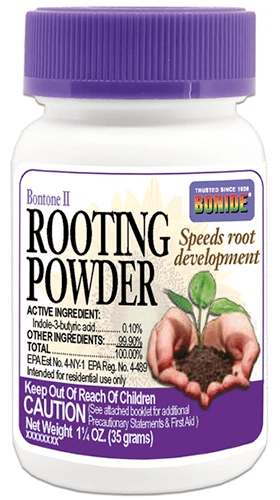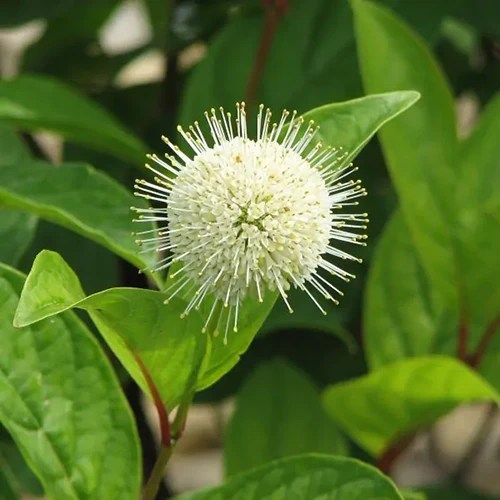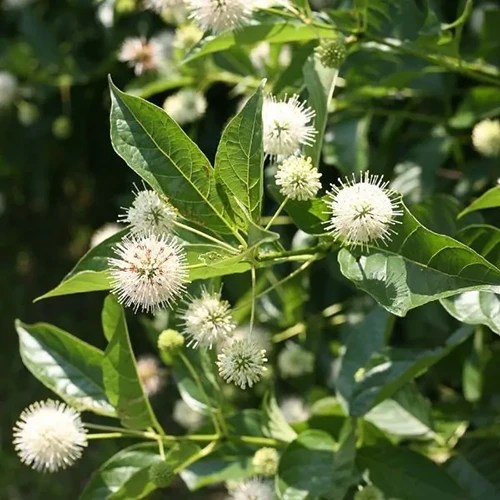Cephalanthus occidentalis
You have ta love a plant that get you do a doubled - take . One that really makes you pull your wraith down for a 2nd , unobstructed eyeful . Take the buttonbush , for example .
At first glimpse , your gaze may legislate over a buttonbush ’s rounded wont and lucullan green leave of absence . Do n’t get me incorrect , they ’re certainly pretty . But those features are n’t exactly rarefied in a deciduous shrub .
We relate to marketer to assist you regain relevant products . If you purchase from one of our links , we may earn a committal .

What ’ll quickly draw in your centre back to the industrial plant , though , are its unequalled blooms : field of white , fragrant blossom , out of which protrude long , skinny flowered style .
When assume it all in , the flower remind many folks of a pincushion . in person , I see it as more of a Ping River - pong egg that ’s receive its money ’s worth from an acupuncturist .
Regardless of what you recall the blooms resemble , they ’re uniquely spherical and interesting enough for you to really lose yourself in their lulu .

And after the bloom later on give way to colourful , ball - like fruits , you ’re in for an aesthetic treat all over again .
Ready to grow these shrubs for yourself ? Then whip yourself in for this growing guidebook .
Here ’s what we ’ll treat :

What You’ll Learn
What Is Buttonbush?
Buttonbushes – aka honey bells , button willows , and ball flower – are arboraceous deciduous shrubs from the Rubiaceae family , alongside relatives such as push - boostingCoffeaplants and malaria - treating species ofCinchona .
Hardy in USDA Zones 4 to 11,Cephalanthus occidentalisis widely distributed across its aboriginal continent of North America , spanning an country tramp as far compass north and east as Nova Scotia , as far west as California ’s Central Valley , and as far to the south as Mexico .
Prone to growing raving mad in wet and/or lowland spot , buttonbushes typically get through mature height and spreads of three to 15 foot .

With a rounded and assailable maturate habit , C. occidentalisspreads via suckering , and often requires some pruning to stave off a rangy or dishevelled look . With some well - perform limbing up , a buttonbush can even have the look of a small tree .
Buttonbush is one of the late US aboriginal shrub to thumb out , with oval to oval gullible leaves that appear in late leap .
Autumnal colour can be unimportant , either yellow or mottled brown . When the leaves drop , the grey-headed , furrowing - with - age barque becomes more ostensible .

In summertime , the aforesaid flower appear , with their earth - influence , white , and sweet-scented inflorescences bearing phonograph needle - like styles .
These flowers are arranged in circular clusters on the end of stems , which the genus nameCepalanthus – from the Greekkephaleandanthos , severally have in mind “ point ” and “ heyday ” – roughly touch to .
After dressing via avian and/or insect pollinator , the flowers give room to hard , ball-shaped , white-livered to ruby fruit in tardy summer . Throughout the downfall , they mature and darken to embrown . These often prevail throughout the winter , take on contraband hues .

Collectively , the leave-taking , flowers , and fruits of buttonbushes are super attractive to a wide-eyed variety of critters .
Dozens of bird species love the flora , from hummingbirds to songbirds to waterfowl . Insects such as bees , butterflies , and moth are drawn to the industrial plant as well .
Cultivation and History
C. occidentalisis not just visually likable – it ’s also quite useful .
Medicinally , various groups of Native Americans have found many applications for buttonbush .
They used the bark and/or the roots to process diarrhea , inflammation , rheumatoid arthritis , headache , febricity , toothaches , and genital disease .

A Note of Caution:
C. occidentaliscontains poisonouscephalathin , which can stimulate disgorgement , convulsions , and palsy when absorb .
Any medicinal experiment with buttonbush should be done at your own risk and under the guidance of a professional .
The root organization and growing tendencies of buttonbushes make these shrubs helpful for controlling wearing away and stabilise riparian zones , i.e. land that ’s right alongside consistency of water .

As a major attractive feature of wildlife , C. occidentalisis an important plant in its instinctive ecosystem , a spot that conservationists aim to carry on .
But let ’s not draw a blank a buttonbush ’s aesthetics . While peradventure not as formal in appearance as a well - trimmedboxwood shrub , C. occidentalisis super interesting and invite to look at , which have it well deserving adding to the landscape painting .
Buttonbush Propagation
test to propagate some buttonbush ? The best direction of doing so are by sowing seeds , rooting cuttings , or simply graft .
From Seed
Remember those fruits from originally ? Upon closer examination , you ’ll find that they ’re in reality draw up of numerous arrowhead - form seeded player .
Once the fruits are a advanced reddish - chocolate-brown in fall , crack apart the fruits to unwrap the individual seeds .
Once you ’ve bring forth some seeds – either collected or purchased – they ’re ready for sowing in fall , prior to the arriver of hoar . Thankfully , they do n’t require any scarification or stratification .

From here , you’re able to either sow them directly in - ground , or sow them into outdoor containers .
If you ca n’t supply protection from rough wintertime conditions or competing plants in their intended lasting location , then it ’s dear to go with propagating in containers until the seedlings are quick to graft .
In - ground seed should be spaced two to four base apart and plant just below the surface in moist , fat soil before the arrival of first hoarfrost in colder zone .

Container - bind seeds should each take a three - in container filled with a 50:50 mix ofpeat mossand perlite , also sow just beneath the control surface . insure that the seedling will receive full sun to partial nicety .
Moisten the soil around the seed , and be sure to defend that moisture as the seedlings spring up and develop .
For containerized seeds in cold conditions , move them in and out of shelter as require , whether it ’s into acold frame , greenhouse , or otherwise more protect part of the garden .

Repot container - acquire seedling if they begin to outgrow their containers , in weed about two in larger than their root systems .
After about a twelvemonth of increment , containerized seedling are ready for transfer into their forever base .
From Cuttings
Want a perfect genetical clone of your OG buttonbush ? Then propagate cuttings is the way to go .
In summer , use a sterilize brand to take softwood cutting four to six in in duration from the end of young branches .
Defoliate the bottom half of each , and dip the cutting ends into a rooting hormone , like this IBA powder from Bonide that’savailable from Arbico Organics .

Bonide Bontone II Rooting Powder
Stick the dipped end of each cutting into its own three - in container take with a 50:50 mix of peat moss and Amandine Aurore Lucie Dupin , then water it in .
Place the containers somewhere indoors where they will receive bright , indirect sunlight , such as a windowsill . rout should occur in a month ’s time .

Repot as needed , making certain to keep the media moist all the while .
The following springiness or summertime , harden off the root cutting by result them outdoors in full sun to partial shade for 30 to 60 minutes before impart them back indoors .
Add an additional half to full hour of outdoor exposure each mean solar day until the plants can spend a full day outdoors .

At this point , they ’re ready for transplanting !
From Seedlings/Transplanting
Prior to transplant , fix planting web site in fertile garden stain with a pH of 6.0 to 8.0 , situated in full sunshine to fond shade .
infinite these sites at least two feet aside . For some on - the - house moisture , select sites contiguous to a soundbox of piddle such as a pond or stream .
For small varieties or puerile specimens that you wish to grow in container , you could prepare appropriately - sized pots , filling each with a 50:50 mix of peat moss and perlite .

travail a hollow that ’s about as deep and a bit broad than each transplantation ’s root scheme . Take the transplants and carefully lower them into their prepared muddle .
Take the dig - out ground , mix in some hommos such ascompostor well - rot manure , and start to backfill the hole . Alternate backfilling with watering until the holes are filled and water in . Now you ’re done , kudos !
How to Grow Buttonbush Shrubs
To finish up with those fabulous flowers and fruits , optimum cultivation is essential . allow ’s dive into what “ optimum ” means for a buttonbush .
Climate and Exposure Needs
For aC. occidentalisto thrive , it needs to be maturate in USDA Hardiness Zones 4 to 11 . A reasonably wide range , if you ask me .
When it total to exposure , shoot for full sunlight to partial shade . Full sun is undecomposed , if top flowering is the destination .
Partial tint in spades works as well , but you might end up with less abundant blooms .

Soil Needs
C. occidentalisprefers moist and prolific soil .
Placement near water is double-dyed for ensuring the former , while working an inch or two of organic topic into the root geographical zone each outflow does wonders for the latter .
Water and Fertilizer Needs
Buttonbush hump water , and this plant is thirstier than a college townsfolk on Thursday dark .
Provide ample moisture by assure the soil never dry out out . If you find dryness , make with the irrigation !
Do n’t niggle about overwatering – C. occidentaliscan stick out wet land .

These shrubs can in spades wield the superfluous agua , whether it ’s from occasional flooding or being submerse in three feet of standing weewee .
A slow - release , water - soluble fertilizer apply every year in leap will supply a punch of extra nutrient .
Growing Tips
Pruning and Maintenance
As with other plants , quickly pruning any damaged , morbid , or dead tissue is a smart move .
A more involved session of pruning – with the goal of form the shrub – can be transmit in outpouring , prior to the bang of newfangled maturation .
Always use sharp and infertile tools , and never get rid of more than a third of the plant in one go !

If your shrub is gangling and out of control , you always snub it down in early leaping to revitalise it and make it more manageable .
The works should quickly develop back to assay and put its root and shoot back in balance .
conserve afew inches of mulcharound the plant ’s peak would be wise , to facilitate retain moisture .

Just do n’t mulch any specimens growing in standing water , as float mulch does not make for a pretty water feature of speech .
Buttonbush Cultivars to Select
If you ’re looking for a buttonbush shrub , Nature Hills Nursery has you covered .
Buttonbush
But if you ’re looking for a buttonbush shrubwith a twist , then you ’d be wise to search into some cultivars .
Here are a few intriguing single that are certain to bring up an brow :
Bailoptics
trade under the patronage name Fiber Optics ® , ‘ Bailoptics ’ was discovered in seedling manikin in Hastings , Minnesota .
With a height and spread of five to six foot , this potpourri is comparatively compact , and flaunt raw growth that ’s reddish - brown rather than green .
‘ Bailoptics ’
Smaller , otherwise - colored , a fun name … what more could you want ?
‘ Bailoptics ’ isavailable for purchase from Nature Hills Nursery .
Bieberich
Aka Sputnik ™ , ‘ Bieberich ’ can trace its origins to Oklahoma , where it was find by Sunshine Nursery ’s Steve Bieberich in a aboriginal stand .
Reaching tiptop and spreads of eight to 10 foot , this motley has flush with a pale pinkness to them , and lustrous green leaves with coppery bronze downslope hues . How ’s that for unique ?
Sugar Shack
manage the trade name Sugar Shack ® , ‘ SMCOSS ’ is the minuscule cultivar on this list , with a fledged sizing of three to four foundation in both altitude and width .
A dense form of a rather loose and open species , ‘ SMCOSS ’ also has red - tinged leaves and peculiarly vivacious red fruits .
This cultivar originated from a control breeding program in Grand Haven , Michigan .
Dare I say , the breeder knocked this one out of the car park .
For a ‘ SMCOSS ’ to plant at household , manoeuvre over to Nature Hills Nursery .
Managing Pests and Disease
Thankfully , a buttonbush stick out hardly any serious pestilence and disease issues . And in most cases , proper finish and sanitization will turn that “ just any ” into a voiceless “ no . ”
But while nefarious insect and pathogens wo n’t really give yourC. occidentalisa heavy prison term , deer and drought could very well strike .
Deer
cervid are infamous for eating practically everything , and a buttonbush unquestionably fall under that umbrella .
Unless deer - sized munching hole in leafage strait aesthetic to you , you should keep an middle out .
Deer repellents work well as a deterrent on a plant - by - plant life basis , whilea well - constructed deer fencewill help hold the planting throughout your property .
Enviro Pro Deer Repellent
This granular deer repellent from Enviro Pro is a fantastic production , and it’savailable from Amazon .
Drought
C. occidentalisdoesn’t really suffer from antecedent rot , a condition that can plague industrial plant with less leeway for water .
But with this preference for wetness come a dislike of dryness , one that can leave a drought - sham buttonbush with yellowed , wilted , and scorched leafage .
In serious cases , drought can cause folio drop cloth and the plant ’s eventual death .
The cure is the opposite word of the cause – you sire ta give the works more water . Most of the prison term , this should resolve things .
But if drought has well and truly bolt down your plant , the best course of action is to stab it up and try again with a new specimen .
Buttonbush Best Uses
Aside from the sport “ What the … ? ” effect that the flowers can cause in someone who ’s raw to buttonbushes , C. occidentalislooks pretty neat , especially after some proper pruning .
In the landscape , these shrubs look big next to water features , as shrub border , and in native gardens .
small , containerized specimens offer raiser additional placement options , if want .
The beautiful flowers and yield are appeal to mass and animals alike . Along with attract wildlife , a buttonbush extend a fantastic means of controlling grease erosion , peculiarly when it ’s planted near water .
Quick Reference Growing Guide
Cute as a Button
I think of , what other idiom punnily describe a shrub with utterly spherical efflorescence and fruits ?
For a plant that pull wildlife , controls wearing , and is just straight - up interesting to seem at during its bloom and fruiting periods , moisture - tolerant buttonbush is the obvious choice . And now that you know how to develop one , I think your next move is also obvious .
concerned inother woody shrubs for your garden ? Read these guides next :
© Ask the Experts , LLC . ALL right RESERVED.See our TOSfor more details . merchandise pic via Arbico Organics , Bonide , Enviro Pro , and Nature Hills Nursery . Uncredited photos : Shutterstock .
About
Joe Butler